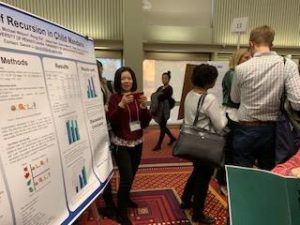Tom Roeper will give a talk in Berlin next week whose title is “The Dignity of a child lies in the Depth and many-sided structure of language”. Details below.
——————–
Liebe Linguistik-Interessierte,
hiermit möchten wir Sie herzlich zum nächsten Vortrag in unserer Reihe “Treffpunkt Sprache” einladen:
“Die Würde des Kindes liegt in der Tiefe und vielseitigen Struktur der Sprache”
gehalten von Prof. Dr. Tom Roeper (University of Massachusetts Amherst)
Datum: Dienstag, 22. Oktober 2019, 18:15 Uhr
Ort: Dorotheenstraße 24, 10117 Berlin, Raum 1.101
Es handelt sich um einen öffentlichen Vortrag – eine Anmeldung ist nicht erforderlich.
Thema
Was bedeutet es, wenn ein Kind auf Englisch sagt: “My mind is very angry and so am I” oder “I’m good at chess because I use my brain instead of thinking”?
Der Vielfalt an Perspektiven, die dem Kind durch die unendlichen Mittel der Sprache zur Verfügung stehen, sind keine Grenzen gesetzt. Wie erfasst das Kind die verschiedenen “Welten”, die in alltäglichen Sätzen wie den folgenden verborgen liegen und leicht zu Missverständnissen führen können:
– “Wer liebt wen?”
– “Kannst Du die Erbsen nicht essen?”
– “Was hat er gesagt, dass er geglaubt hat, dass er tun kann?”
Wir diskutieren: 1. die Anwesenheit von Rekursion (der Fähigkeit, einen Prozess in sich zu wiederholen), 2. die Fähigkeit, das Wissen anderer zu erfassen, und 3. welche Frage wirklich diskutiert wird, wenn man sagt: “Niemand kommt” und jemand antwortet: “Nein”.
Wir werden sehen, dass viele sprachlichen Fähigkeiten bereits angeboren sind und nicht erst erlernt werden müssen.
Zur Person
Tom Roeper ist Professor für Linguistik an der University of Massachusetts Amherst und arbeitet hauptsächlich im Bereich des Spracherwerbs. Er hat Untersuchungen in den Gebieten Syntax, Semantik und Pragmatik in 10 verschiedenen Länder durchgeführt und dabei mit vielen anderen Wissenschaftler*innen, insbesondere auch Kollegen und Kolleginnen am Leibniz-Zentrum Allgemeine Sprachwissenschaft, zusammengearbeitet. Er hat einen Test für Sprachstörungen – den DELV™ (“Diagnostic Evaluation of Language Variation”) – ausgearbeitet, der mittlerweile in einer Vielzahl verschiedensprachiger Länder angewandt wird. 2007 veröffentlichte er das Buch “The Prism of Grammar: How Language Acquisition Illuminates Humanism” (MIT Press).
Wir würden uns sehr freuen, Sie bei diesem Vortrag als Gast begrüßen zu dürfen!
Im Anschluss besteht wie immer die Gelegenheit zu Gesprächen in kleineren Gruppen.
Der “Treffpunkt Sprache” ist eine gemeinsame Vortragsreihe des Leibniz-Zentrums Allgemeine Sprachwissenschaft sowie des Instituts für deutsche Sprache und Linguistik und des Instituts für Philosophie der Humboldt-Universität zu Berlin.
Der nächste Vortrag der Reihe findet am 26. November 2019.
Herzliche Grüße
Das Öffentlichkeitsteam des Leibniz-Zentrums Allgemeine Sprachwissenschaft




